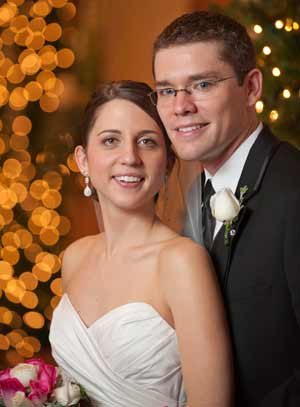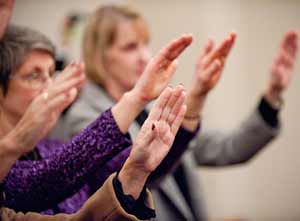 Lauren and Aaron Jarvis were married in a non-denominational chapel on Jan. 1. Should they choose to make their marriage a sacramental commitment, they will benefit from a Catholic community that will welcome them, rejoice with them and support them. (Photo courtesy Jon L. Hendricks Photography www.jonlhendricks.com)I like weddings. I like witnessing a couple expressing their love of and commitment to each other. And I like the food, music, dancing and camaraderie that are part of the celebration. But I’m an even bigger fan of marriage, and while they are obviously related, each is unique.
Lauren and Aaron Jarvis were married in a non-denominational chapel on Jan. 1. Should they choose to make their marriage a sacramental commitment, they will benefit from a Catholic community that will welcome them, rejoice with them and support them. (Photo courtesy Jon L. Hendricks Photography www.jonlhendricks.com)I like weddings. I like witnessing a couple expressing their love of and commitment to each other. And I like the food, music, dancing and camaraderie that are part of the celebration. But I’m an even bigger fan of marriage, and while they are obviously related, each is unique.
Weddings and their planning involve tangibles. Colors, sounds, tastes and smells are exciting. Of course such a sensual experience is going to attract people’s attention. It’s the midway at the county fair.
We speak about marriage as institution, union, commitment, sacrament. Those words don’t generate mass excitement. We might be reluctant to talk about marriage to an engaged couple because it is so personal and intimate when contrasted to the wedding.
The latest “I do” in our family was pronounced by my younger daughter, Lauren, to Aaron on Jan. 1. Like her two older brothers’ weddings, this was an education in several areas, e.g., culture and society, religion, diplomacy, communication and the importance of keeping one’s sense of humor.
One afternoon during their year-long engagement, after hearing parts of my wife’s detailed discussions about food, table decorations, venues, invitations and flowers, I asked her, “Is anyone as concerned about the marriage as they are about the wedding?”
I didn’t ask this because I had doubts about the couple’s love and commitment; I asked because I know – from observation, 35 years of marriage and listening to country and western music for more than 40 years – how difficult marriage can be. Even the best marriages, no matter how deep the faith and love, no matter how open the communication and strong the commitment, have their challenges.
Neither Aaron nor Lauren is a church-goer. He has no religious affiliation; she is nominally Catholic. When it came to discussing where they would be married, she got religion or, more accurately, she revisited her religion. In other words, she wanted to get married in church.
She asked me if they’d have to go to “classes” and “do paperwork.”
“Yes and yes.”
“Does Aaron have to become Catholic?”
“No.”
“Do I have to belong to a parish?”
“Yes.”
“Why?”
“Why do you want to get married in church?”
Eventually, she clarified for me that she wanted to be married in “a” Catholic church but not “the” Catholic Church.
What she was looking for was a venue in which they could publicly proclaim their love for each other. I shared with Lauren how the church views marriage as a sacrament, about what it means when a couple is married in the Catholic Church, why this is a serious matter in the eyes of the church, and why it emphasizes thorough preparation for couples making this sacramental commitment.
It was a good conversation – one of several we had about marriage. I didn’t lecture. There was no reason to lay the ol’ “How dare you not get married in the Catholic Church!” line on her. (I do wonder how many couples have succumbed to that and similar guilt-laden exclamations only to never embrace the church for the rest of their married lives.)
Neither of our oldest sons was married in church. As parents who tried to pass our faith along to our children, all three children’s decisions not to be married in the Catholic Church initially had us chanting the, “What did we do wrong?” litany. I have yet to meet parents who have answered that question for themselves or who even received reassurance by asking it. At this point, did it really matter what we did or didn’t do? We stopped beating ourselves up about it.
 During the marriage ceremony for Aaron and Lauren Jarvis in a non-denominational chapel, attendees were asked by the officiant to extend their hands in blessing over the couple. (Photo courtesy of Jon L. Hendricks Photography www.jonlhendricks.com) Are we disappointed that they didn’t get married in the church? Yes, but not because we didn’t know what to tell friends and relatives. We are disappointed for them because we feel they are missing out on a tremendous gift.
During the marriage ceremony for Aaron and Lauren Jarvis in a non-denominational chapel, attendees were asked by the officiant to extend their hands in blessing over the couple. (Photo courtesy of Jon L. Hendricks Photography www.jonlhendricks.com) Are we disappointed that they didn’t get married in the church? Yes, but not because we didn’t know what to tell friends and relatives. We are disappointed for them because we feel they are missing out on a tremendous gift.
First, there’s the preparation. Any couple that takes Catholic marriage preparation seriously can’t help but learn more about themselves individually and as
a couple. Pair the marriage preparation options provided by the Archdiocese of Milwaukee (http://tinyurl.com/67pqxvl) with the formation couples receive at their parishes, and they have ample opportunities to examine their commitment, how they communicate and resolve conflicts, to learn the theology of marriage and to receive an overview of natural family planning.
Secondly, the combined strength of “sacrament” and “marriage” is unique in that the grace of the former and the love of the latter form a pliable bond capable of withstanding nearly every problem that can be encountered during the couple’s life together.
As the U.S. bishops note: “The sacrament of Christian marriage involves their entire life as they journey together through the ups and downs of marriage and become more able to give to and receive from each other” (www.foryourmarriage.org/marriage-as-sacrament/). Finally, there’s the support of the Catholic community. On the weekend a couple is married in our parish, they are included, by name, in the prayer of the faithful at all of the Masses. Thanks to the Nazareth Project of the John Paul II Center, there are marriage enrichment opportunities, e.g., Destination Marriage and Marriage Encounter, to deepen their love and commitment (https://jpiihealingcenter.org/).
I did not hesitate to ask Lauren, “Is anyone as concerned about the marriage as they are about the wedding?” She knew I was asking because I was concerned, not nosy. She assured me that she and Aaron were focused on their marriage. I was relieved to hear that. The thought of them, or any couple, putting so much energy into their wedding while giving little thought to the marriage it celebrates concerns me.
As much as I enjoyed their wedding, I am enjoying their marriage even more, witnessing their happiness, watching them grow in their love for each other. I pray that continues, but I also pray that they grow in their love of God and that they realize how much love he loves them and can bring to their marriage.
As parents, we pray that they will recognize the gift that faith in God is, and we pray that, should they accept that gift, that they will grow in it. Should they reach the point where they are ready to make their marriage a sacramental commitment, we hope they know that the Catholic faith community will welcome them, rejoice with them and support them.
